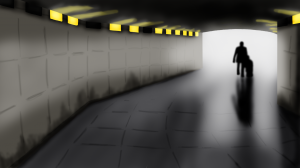 The process of creating a novel is much longer and has many more stages than just writing. Writing ‘The End’ is rarely the actual end of the process. Editing. Then more editing. Then proofreading. Maybe even a rewrite. Even after the final copy has been emailed or posted to whoever will see it first there is the stage of letting go. But do we really need to let go completely?
The process of creating a novel is much longer and has many more stages than just writing. Writing ‘The End’ is rarely the actual end of the process. Editing. Then more editing. Then proofreading. Maybe even a rewrite. Even after the final copy has been emailed or posted to whoever will see it first there is the stage of letting go. But do we really need to let go completely?
We can become so involved with our characters that we feel we know them. We hear them in the middle of the night, calling to us. We can’t wait to write them into the next scene. Then, finally, we give them their ending. But is this the end of the relationship with our characters?
For writers who aim to be published, their hopes and dreams are carried forward with their characters, and they talk about them in present tense. For writers who are not aiming for publication the process of letting go maybe slightly easier, but still a series of stages that means a saying goodbye to the familiar and taking a first step into the unknown of a new project.
So how do you say goodbye to characters who have been inhabiting your waking (and sometimes unconscious) thoughts for months, sometimes maybe years? How do you forget them and begin a new project? There are several ways to separate from your novel and your characters, some of them naturally and some of the forced. And there are some reasons to not let go.
If you have your work published then your characters live on through other people’s perception of them, and you are only saying goodbye to their story, and not to them – the connection is still strong and real.
But if you have submitted your work to agents and publishers and exhausted all avenues of publication, you may have no choice but to shelve your novel. This can seem harsh. The characters you have come to know and love will be stored on a flashdrive forever. Or will they? Writers often need to go through the process of shedding the subjectivity in their writing, losing, to some degree, the autobiographical aspects of the story.
While stories are filtered through experience and imagination, some writing is clearly dealing with the flotsam and jetsam of personal darlings which are often exorcised through early work. This is an essential process for some writers, including myself, and very sad because while the ‘messages’ that drive the early work are sometimes overt, obvious and unnecessary, the characters who carry them and are often banished with this work are the beginnings of the people who will eventually carry your true voice into future stories.
So no page is ever wasted. Three 90k word novels may be languishing on your flashdrive never to see the light of day, but within these lies the seeds of your next novel. With the benefit of distance you will see what worked and what didn’t. Which characters remain with you and those you can easily say goodbye to.
When you let go of your previous novel and commit to the first blank page of your next project, be sure to remember the good in your previous work, whether published or not. And take the good characters with you in one form or another – no need to say goodbye.